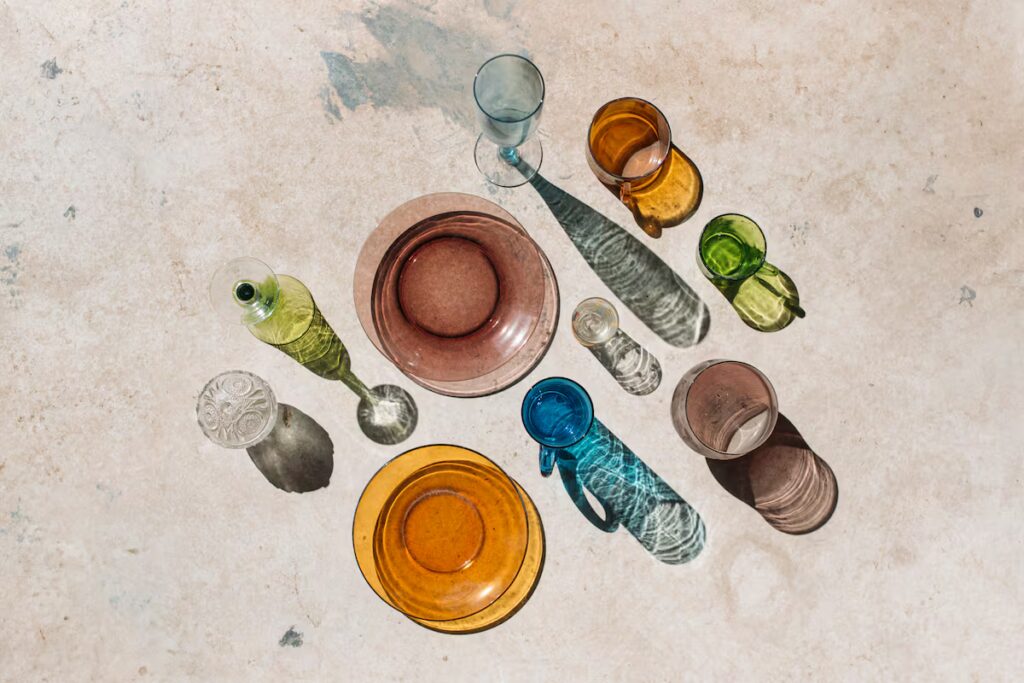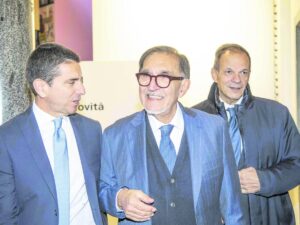
In Murcia there is a place where time has remained trapped between crystal glasses. Juan Bohajar (Murcia, 28 years old) didn’t just inherit a business. Behind the doors of the industrial warehouse that belonged to his grandfather, he also found a treasure. Shelves filled with boxes that reached to the ceiling filled with household items. Covered in dust, the history of Spanish domestic glassmaking, from the 1920s to the 1980s, waiting for the perfect moment to see the light again. This came in January 2024, when Bohajar, grandson of Antonio Bohajar López, decided to slowly release the thousands of references of glasses, cups, plates, vases, ashtrays, pots, decorative figures and other objects that decorate and serve a home, stored in a family warehouse.
“Cristal Antiguo is in a certain sense a way to complete my grandfather’s work,” says this young man from Murcia who is behind the project. His grandfather started in the household goods sector at a very young age, helping his father sell porcelain and ceramics in the provincial markets. At the age of 18 he took over the warehouse where he worked when he was just 13 and, shortly after, he was able to acquire his own premises and begin traveling around Spain to purchase goods. “My grandfather bought everything. First, second, third, business… The two shops he had in Murcia were very well known and it can be said that almost all the families in the city have something from La Casa del Cristal, the name with which the business was baptized at the time.”
After studying ceramics at the Manises school, Juan’s father, Juan Antonio Bohajar, took over the family business. “My grandfather died when my father was very young and in the 1980s he started running the shop together with my grandmother. A few years later my mother also joined.” In family businesses of the last century, women were as important as their husbands, but they were almost always left out of the story. Women who, in addition to working at home, worked entire days outside, often without even paying contributions. “I want to name my grandmother, Consuelo Calvo, and my mother, María García. My father, my grandfather and my great-grandfather have always been the visible face, the germ of the company…, but without them the story would not be the same”, explains Juan Bohajar.
He also says that at that time most of the pieces his grandfather kept in warehouses were out of fashion. In the 1980s it wasn’t Cold purchasing tableware from previous decades, so his parents concentrated on purchasing more current pieces and orienting the business to the needs of the moment. The end of this purely family business came, like that of many other family businesses, in 2008, when the first shopping centers in Murcia and the large Swedish giant Ikea appeared, with a very powerful impact on local businesses in the city. In the same year the Crystal House closed its doors and everything that remained from the previous phase was kept just as Antonio had left it in a warehouse on the outskirts of the city. It would remain there for decades.

Coincidences may exist and may not exist. Perhaps those jewels intended for table service slept there so that this young man with a surname that sounds like blown glass would find them when the exact moment arrived. Meanwhile, Juan Bohajar began studying law. “I spent seven years at University, until I realized that it wasn’t the time. I was in Murcia without much work and my father asked me to empty a small place that belonged to my grandfather and that we had in the city, to take advantage of it. The first morning I started to open and take out colored glasses and legendary glasses of a lifetime. And suddenly I realized that I had a treasure there.” Bohajar remembers the response his father gave him when he told him: “There? There are the scraps…, in the ship there is everything of value.”
Juan didn’t hesitate, he had to do something with that gift: give it an outlet, finish what he started so long ago in that same place. Give meaning to those pieces. Today they have more than 5,000 references of all kinds of household items, especially glass and tableware, and some of them can reach up to 12,000 units. And while vintage, crafts, antiques… have never been as trendy as they are now, Bohajar knows the project has a purpose. “I have the supplies that my grandfather left me, which are very many, and if one day they run out, Cristal Antiguo will disappear with them,” he says. This is not your typical antiques business. Nothing for sale has ever been used. “At most I cleaned it with my hands, but nothing more.” In fact, whenever you have lent some parts for film shoots or photo shoots, these parts are immediately removed from the warehouse.
As the project took shape, Bohajar embarked on a personal journey to gain in-depth knowledge of the world of 20th century housewares. “I’ve been involved in this world my whole life, but now I want to be a part of it.” He remembers an initiation trip he took with his father, the very same one he took with his father. “We traveled around the north, we visited Gijón, samples and exhibitions on the history of glass and earthenware in Asturias. We went to the abandoned factory of San Claudio. My father was overcome with sadness when he remembered it in operation.”



In addition to the beautiful plates and glasses, the industrial history of Spain can be read in the rows of boxes yet to be discovered. From handcrafted pieces, blown glass and hand-painted crystals, to the development of industrial arts in the 1930s and 1940s, which maintained many artisanal processes. To arrive at the deindustrialization and centralization of work during the 1980s, with the progressive closure of national factories dedicated to porcelain, glass or metal. Small and medium-sized enterprises unable to compete with giants in international markets, the emergence of industrial materials for mass production. Thus, what is artisanal and familiar has gradually become extinct. In the succession of fashions and forms of production, the ornamental phases of Spanish houses from the 1920s to the 1980s can be analysed. It was not just about the loss of jobs and what this meant for the social fabric of the working class, trade unionism, but how a heritage had also disappeared with the disappearance of the techniques and processes of production and craftsmanship.

The pieces can be found in their online store. In the meantime, they can be purchased at live events announced on their social networks, @cristalyantiguo. He also receives requests and orders for personalized crockery and glasses via Instagram. Some Vetri Antichi references can be found in Madrid, in the La Official Cerámica shop.
Juan Bohajar says: “This business trip is also a way to get to know my grandfather and my story. Opening that ship didn’t just mean finding the objects he had bought. It was also an archaeological process, entering his intimacy, his books, his accounts, his photos, his letters… As if all this was there to allow me to make my own way.”

Gastro Special from ‘El País Semanal’
This report is part of the Gastro Special prepared by “El País Semanal” and EL PAÍS Gastro and which will be published in its printed edition on Sunday 23 November.





